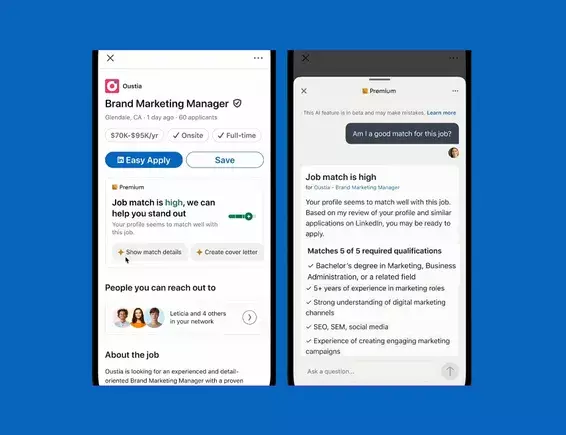The job market is ever-evolving, and with technological advancements, job seekers find themselves navigating a landscape that is increasingly influenced by artificial intelligence (AI). LinkedIn, a dominant platform in professional networking, has recognized this trend and is now introducing cutting-edge AI tools designed specifically for job seekers. This article delves into the details of LinkedIn’s new features, namely the “Job Match” tool and the recruitment AI agent, exploring how these innovations can significantly enhance the job-hunting experience.
At the forefront of LinkedIn’s latest offerings is the “Job Match” tool, an innovative addition to job listings that aims to assess and elevate a user’s probability of securing a chosen position. How does this feature work? Essentially, the Job Match tool analyzes a user’s profile, highlighting how their skills and experiences align with the qualifications set forth in job postings. This function not only identifies the strengths of a user’s profile but also offers actionable advice for improvement.
One of the most compelling aspects of the Job Match tool is its ability to generate a match summary. Job seekers are presented with a comprehensive overview that details the correlation between their qualifications and job requirements, encompassing both essential and preferred skills. This immediate feedback mechanism enables users to target their job applications strategically, increasing their chances of success significantly. Furthermore, the tool recommends actions such as refining a cover letter or engaging in specific courses to enhance their candidacy.
For LinkedIn Premium subscribers, the benefits of the Job Match tool are amplified. Premium users gain access to additional insights regarding their applications, including a categorical rating that ranks them against other applicants. This feature indicates if an individual is categorized as a high, medium, or low match, thereby offering a clear understanding of their standing in the competitive landscape. This heightened transparency can empower users to refine their applications further and focus their efforts on roles where they possess a competitive edge.
Moreover, premium resources extend beyond mere ratings. Users can optimize their resumes and cover letters with AI-driven recommendations designed to sharpen their appeal to potential employers. The platform’s emphasis on data, derived from millions of job postings and profiles, ensures that the advice provided is relevant and tailored to current market trends. As the global rollout of this feature continues, job seekers can expect a more personalized and effective approach to their job search.
In addition to supporting individual job seekers, LinkedIn has unveiled a new recruitment AI agent aimed at aiding small-to-medium-sized businesses (SMBs) in streamlining their hiring processes. This tool simplifies the way businesses engage with potential candidates through an easy-to-use interface. With just a few clicks, employers can create job listings, connect with applicants, and evaluate responses effectively.
As many SMBs struggle with recruitment logistics, this tool serves as a vital resource to maximize efficiency during the hiring journey. The AI agent provides tailored guidance throughout the recruitment process, empowering employers to make informed decisions swiftly. LinkedIn’s move to assist SMBs underscores a comprehensive strategy to address various facets of the job market, making it a versatile ally for both job seekers and recruiters.
Embracing the Future of Job Search and Recruitment
LinkedIn’s introduction of AI-powered tools marks a significant step forward in transforming how individuals seek employment and how companies recruit talent. This innovation aligns with the company’s vision of cultivating an “agentic era” where AI agents play a crucial role in guiding daily professional interactions. As these tools are progressively integrated into job-seeking strategies, they hold the potential to not only enhance the effectiveness of applications but also to redefine the standards of recruitment practices.
Job seekers looking to harness these advancements will undoubtedly find the experience of searching for the right opportunity to be more systematic and personalized. Meanwhile, businesses can expect more streamlined recruitment processes that cater to their specific needs. As both sides adapt to these enhancements, it’s clear that proficiency in utilizing such tools could be a game-changer in the contemporary job market. In 2025 and beyond, adapting to AI-driven processes will not just be an advantage; it may become a necessity in achieving professional goals.

